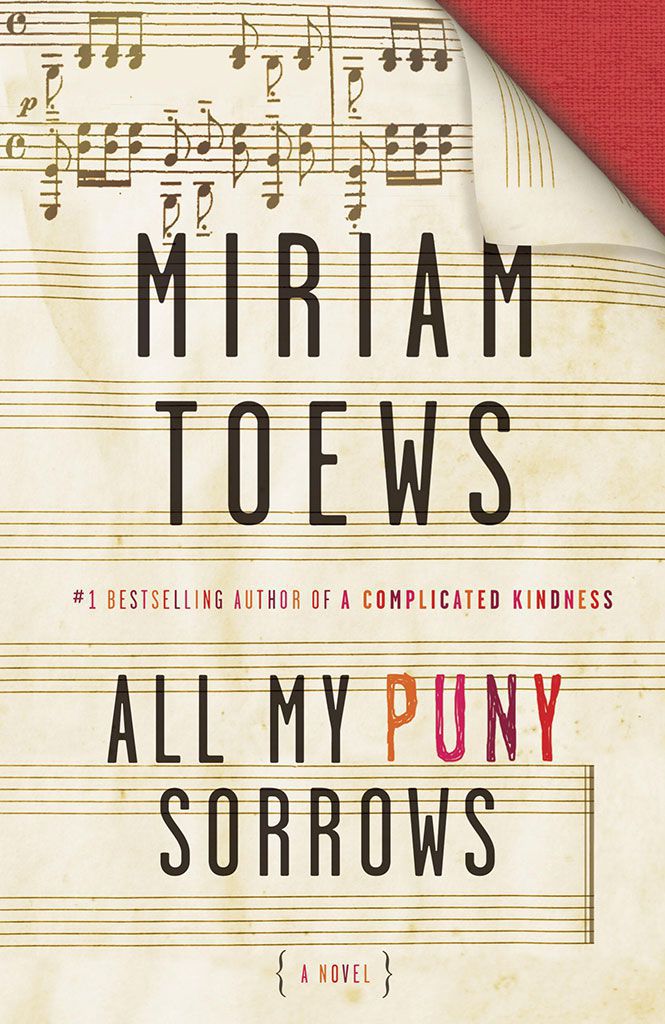 All My Puny Sorrows {a Novel} by Miriam Toews
All My Puny Sorrows {a Novel} by Miriam Toews
Review: All My Puny Sorrows
Miriam Toews, All My Puny Sorrows. Toronto: Alfred A. Knopf Canada, 2014.
Miriam Toews’ All My Puny Sorrows {a Novel} (Giller Prize finalist, and winner of the Roger’s Trust Award) takes us, once again, into the darkness that love, at times, must bear. With the wit and humor characteristic of our beloved Nomi (A Complicated Kindness),Yolanda is the narrator of this story set in Winnipeg, and, at times, returns to the community of East Village, the small Mennonite town with small minded church elders. We are women in our forties now,
states Yoli about her and her sister Elf, and I can’t help thinking about Nomi, all grown up.
My first introduction to the author Miriam Toews was in 2000, in her poignant and profound memoir, Swing Low, dealing with her father’s suicide. I was drawn to her writing, her ability to access the voice of her father; to negotiate complex emotions and pose difficult questions. Her work also posed questions about genre as Toews captured the imagined inner voice of her father. I followed up with her multiple-award winning A Complicated Kindness, published in 2004, and every book thereafter. The recurring thought I had reading this work, which draws heavily on life, was, once more, about the interstices of memoir and fiction.
Yoli’s beautiful sister Elf, a renowned concert pianist, married to a wonderful man, feels as though she has a glass piano in her stomach, terrified it will break. The story unfolds in visits to the hospital in Winnipeg, and in the emotional and moral dilemma posed by Elf’s request of Yolanda to take her to Switzerland where she can take her own life in the presence of the sister who loves her. Yoli, an author of rodeo novels living in Toronto, is unconventional, a self-described mess who has tried therapy but prefers a bottle of chardonnay and a bag of weed, the single mother of teenagers, and has, as do all Toews’ protagonists, a heart of gold. Lotti loves her two daughters unconditionally, is always hopeful, a woman who when she goes to the ocean enjoying the sun by bobbing along on her back, gets stranded out at sea, but doesn’t
panic, just sort of slowly drifts away from the shore and waits to be noticed or missed. Her big thing is going beyond the wake where it’s calm and she can bob in the moonlight far out at sea (111).
In readings at book festivals and author interviews, Toews has made it clear that, like Yolanda’s sister Elfrieda, her older sister struggled with mental illness. Perhaps emotionally, the manuscript for this book was, but for the ending, already written out in her mind. With this novel Toews, and Yoli, confront the question of assisted suicide. I don’t want to go to jail (147). What is love? (152). On another level, Toews has been forthright about her motive to reveal a healthcare system in Canada that fails those who suffer from mental illness. Yoli frustrated, is resigned about the possibility of Elfrieda getting the help she needs; (S)he’s going home, I know it. She shall be released. I know that if she follows the rules and tells the doctors and nurses that she’s feeling good, positive, not suicidal, not at all—are you kidding me? And be forced to say goodbye to the majesty of all this?—that she will be home in time for dinner today
(108). This is the very situation Toews writes about her father Mel in Swing Low. Yoli’s inner diatribe is the cry of many: Imagine a psychiatrist sitting down with a broken human being saying, I am here for you, I am committed to your care, I want to make you feel better, I want to return your joy to you, I don’t know how I will do it but I will find out and then I will apply one hundred percent of my abilities, my training, my compassion to your health—to your well-being, to your joy….
(176).
How does one deal with such anguish? Is a dose of wry wit, dry humor, and a helping of anger enough to carry you along? In all its tragedy and pain, this story is laced with humor, self-effacing, sarcastic, irreverent, and laugh-out-loud. And the thing about grief is that everyone exhibits it differently. Perhaps when there are so many profound losses within one family, there is no other choice but not to fight it—to go beyond the wake where it is calm and just bob there, far out at sea in the moonlight. In this view, Toews is perhaps most true to her Mennonite roots (despite unflattering characterizations of some Mennonites in East Village). There is great tenderness and love in All My Puny Sorrows. It is love that carries you, and this pervading, prevailing theme compels millions of readers to return to the award-winning novels of Miriam Toews.